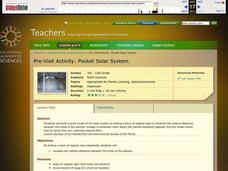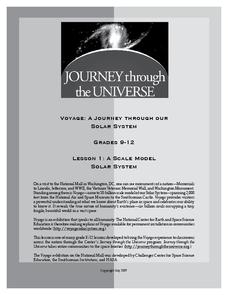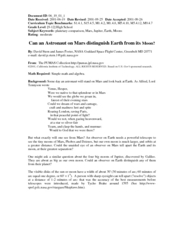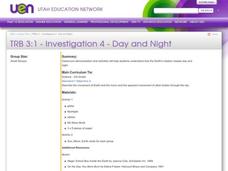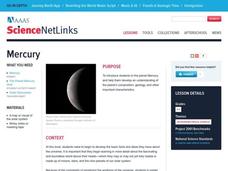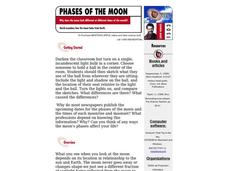Curated OER
Paper Mache Solar System
Students make a model of the solar system. In this solar system lesson plan, students make paper mache models of the planets to hand in the classroom, measure the distance to each planet scaled with footsteps, and model the moon's...
Curated OER
an Explorative Journey Through the Solar System
Students, in groups, research a planet from our solar system. They create Styrofoam models of the planets and place the planets on a correct distance scale from the sun.
Curated OER
Planetary Poster
Students engage in a study about the planets and create a poster as one of the projects during the study. They create individual charts for mapping the solar system so the locations can be found in mock space missions to other planets.
Curated OER
Planets Database
Students research and create a database about planets and share the information.
Curated OER
THAT'S WHY THEY CALL IT SPACE
Ninth graders set up a scale model of the solar system using the same scale for distance and diameter. They calculate scale distances and sizes for modeling the solar system and relate actual distances to difficulties in discovering and...
Curated OER
SIZING UP SOL
Ninth graders produce a projected, pinhole image of the sun and from measurement of the image and projection distance, calculate the actual size of the sun. They estimate the sun's apparent brightness from different planet.
Curated OER
Pocket Solar System
The scale of the solar system is difficult to grasp without some sort of concrete visual; with some register tape and different-sized stickers, teach astronomers of any age just how spread out our solar system really is. Try to use...
Journey Through the Universe
A Scale Model Solar System
Between the time scientists discovered Pluto and reclassified it as a dwarf planet, it did not even make one full revolution around the sun. In two activities, scholars investigate scale models and their properties. Pupils find that it...
Curated OER
Measuring the Speed of Light
Students explore physics by completing measurement problems in class. In this speed of light lesson, students discuss the importance of knowing the speed of light and how it affects many aspects of human life on Earth. Students identify...
Curated OER
The Great Hubble
Students explain how Hubble telescope captures images from space. In this space science lesson, students use the internet to view space photos. They debate on an issue raised by the teacher.
Curated OER
Can an Astronaut on Mars Distinguish Earth from its Moon?
High schoolers explore the possibility of being on Mars and being able to identify the Earth. In this space lesson plan students complete a set of calculations to see if this is possible.
Curated OER
Making Numbers Manageable
Eighth graders recognize and express numbers when written in time saving techniques. They gather data from a variety of sources, including print and electronic media. They develop a presentation using a variety of techniques.
Curated OER
Planet Structure & Interior
Students compare Jupiter and Earth. In this Earth and space studies lesson, students compare the composition of Earth and Jupiter and analyze how the composition affects the rate at which the planets spin.
Curated OER
Day and Night
Third graders view a classroom simulation that demonstrates how the Earth's rotation creates day and night.
Curated OER
What Orbital Dynamic Variables are Responsible for Earth's Weather?
Students explore the changing of the seasons. In this astronomy and seasons instructional activity, students construct a model of the revolution of the sun and the moon. Students compare the recorded solstice/equinox orbital positions...
Curated OER
Our Solar System to Scale
Middle schoolers calculate the diameter of planets and their relative distances. In this space science lesson, students discover how small or big the planets are in comparison to each other. Middle schoolers use cross multiplying...
Curated OER
Does the Distance Between the Earth and Sun Cause the seasons?
Learners reflect upon the concepts of seasons. The concepts are taught using a variety of different teaching approaches. A activities lead to a reflection that will help students to make a cognitive transfer of information form...
Laboratory for Atmospheric and Space Physics
Looking to the Future
New Horizons set forth on a mission to Pluto in 2006. Ten years later, the spacecraft is still on its way. Here, enthusiastic scholars predict what they will be like—likes, dislikes, hobbies, etc.—when New Horizons arrives at its...
Curated OER
Solar System Fun Facts
Students read facts about the Solar System. In this solar system lesson plan, students read facts on the dimensions, planets, and workings of the solar system. There is a big emphasis on Saturn.
Curated OER
Mercury
Students study the planet Mercury and develop an understanding of the planet's composition, geology, and other important characteristics. They explore a Web resource on the planet Mercury which is the central focus of this lesson.
Curated OER
Phases of the Moon
Young scholars explore why when you examine the moon depends on its location in relationship to the sun and Earth. The moon never goes away or changes shape-we just see a different fraction of sunlight being reflected from the moon to...
Curated OER
Amazing -- Saturn Is So Far Away!
Students work together to create a scale model of the distances between the planets. They write a paragraph to describe Saturn and their make-believe trip to the planet. They identify other characteristics of Saturn as well.
Curated OER
Retrograde Motion
Students study the motions of the heavenly bodies. In this space lesson plan students use models to show a variety of schemes explaining the motions.
Curated OER
Scale Model of the Solar System
Students explore the size of the planets. In this science instructional activity, students create a scale model of the solar system. Students determine a scaling factor and calculate the size of their planets. Students create a scale...








